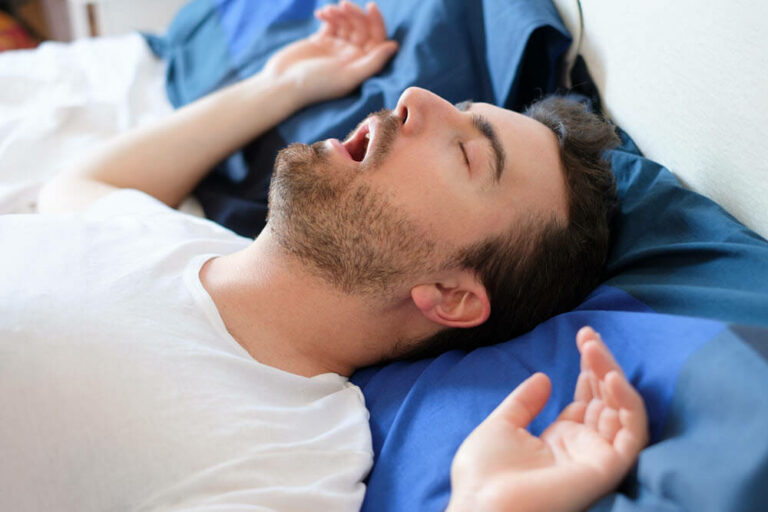Sweating is a normal bodily process that helps regulate body temperature. When you’re in a sauna or exercising, it’s quite normal to sweat a lot. However, waking up all sweaty when you wake up in the morning is quite a different story.
Hot flashes can happen while you’re asleep and with no physical effort. The causes of hot flashes aren’t warm sleeping environments or heavy blankets. Instead, different underlying health issues can cause these episodes of significant sweating while you’re asleep.
Hot flashes can cause poor sleep, affecting your daily quality of life, your relationships, job performance, and a general sense of well-being. As a result, it’s quite natural to want to know what causes these hot flashes and how you can resolve them. We’ll help you get there, so let’s get started.
What Are Hot Flashes?
A hot flash is a sudden feeling of warmness that mostly occurs in the upper body, and it’s usually most intense throughout the chest, neck, and face. Your skin may turn spotty and red as if you’re blushing. As we said, these hot flashes are often followed by sweating. After excessive sweating, it’s also common to feel cold. If you’re waking up with hot flashes, you’re most likely suffering from night sweats, which are hot flashes that occur while you’re asleep.
Different health issues can cause hot flashes, but they’re the most common symptom during menopause. The technical term for hot flashes is vasomotor symptoms. They begin when blood vessels near the surface of the skin spread to cool off, causing you to sweat a lot.
The intensity and the frequency of the hot flashes are different for every person, and each episode can last only a minute or two, or sometimes even more than five minutes.
Menopause and Hot Flashes
When it comes to women’s health, menopause is maybe the most common cause of hot flashes, also known as menopausal hot flashes.
Menopause is divided into three stages: perimenopause, menopause, and post-menopause. It’s worth noting that only perimenopause and menopause are associated with hot flashes, and in postmenopausal women, the hot flashes are usually gone.
Menopause is a natural process in which the women’s ovaries are no longer releasing eggs, and the estrogen levels and progesterone levels are decreasing. The culprit for these hot flashes is the hormonal changes that a woman’s body undergoes. Namely, estrogen and progesterone levels tend to decrease, and both of these hormones play a crucial part in the processes of the human body. To name a few, they can affect appetite, mood, sleep, etc.
For example, estrogen is involved in the metabolism of neurotransmitters such as serotonin, which affects the sleep-wake cycle. On the other hand, estrogen helps keep the temperature of the body low during the night, which contributes to a good night’s sleep. It also has an antidepressive effect. If the estrogen levels are too low, women experience hot flashes and poor sleep.
Two treatment options can help you with menopausal hot flashes:
- Estrogen Replacement Treatment (ERT). This treatment option increases estrogen levels.
- Hormone Replacement Therapy (HRT). This treatment option increases the levels of both hormones – progesterone and estrogen.
However, when it comes to HRT treatment, there are some risks, especially for menopausal women who have had strokes, blood clots, breast cancer, or heart attacks. So, before you go for either of these treatments, you must consult your gynecologist.
Other Causes of Hot Flashes
Although hot flashes are common menopausal symptoms, they can be caused by other medical conditions or as side effects of some medications that you might be taking.
Hormone Disorder
Changes in the endocrine system, the system that controls hormone levels in the human body, can also be associated with hot flashes. Here are some of them:
- Thyroid disorder, especially if the thyroid is overactive (hyperthyroidism), can cause hot flashes during sleep. A simple TSH blood test can determine this medical condition, and if this is a reason for your hot flashes, a doctor can prescribe you suitable medications to relieve them.
- Pheochromocytoma is a type of tumor on the adrenal gland that increases the hormone level of the catecholamines.
- Carcinoid syndrome is an overproduction of particular hormones caused by tumors of the gastrointestinal systems or lungs.
- Hypothalamic dysfunction can also be related to hot flashes, as the hypothalamus helps in temperature regulation.
Medications
Certain medications can cause hot flashes as a side effect, namely:
- Steroids like prednisone;
- Anti-inflammatory medications, a.k.a. antipyretics like ibuprofen, aspirin, and acetaminophen;
- Pain-relieving medications like hydrocodone;
- Antidepressants and antipsychotics;
- Medications for diabetes, like insulin;
- Medications for high blood pressure.
Suppose you experience hot flashes as a side effect from some medications that you’re taking. In that case, it’s recommended to consult your doctor in order to switch you to a similar medication that won’t cause hot flashes.
Sweating Disorder
Sweating disorder, also known as idiopathic hyperhidrosis, is an incredibly rare medical condition where the human body produces excessive sweat without any identifiable medical cause.
Individuals who have hyperhidrosis are sweating to the point where moisture can literally drip from their palms. While hyperhidrosis is mostly harmless, it can be associated with other medical conditions in some cases.
There are two types of hyperhidrosis:
- Primary hyperhidrosis, which can cause excessive sweating in the face, feet, underarms, and palms with no obvious reason;
- Secondary hyperhidrosis, which can cause excessive sweating throughout the entire body.
However, only secondary hyperhidrosis can cause hot flashes while you’re asleep.
Breast Cancer Treatment
According to the National Institute for Cancer, hot flashes and night sweats can be associated with breast cancer treatments. Chemotherapy and radiation can often cause young women to go into menopause prematurely, and older women can also go into menopause due to the chemotherapy treatments.
All of this is due to hormonal changes. When taking the estrogen-modulating medication known as tamoxifen, it can lead to a decrease in the estrogen level, which can trigger hot flashes. Particular procedures, such as surgery for removing one or both ovaries, can lead to low estrogen levels as well, resulting in hot flashes.
You can try to manage these symptoms by limiting the consumption of hot drinks and spicy food, avoiding saunas, hot showers, and other triggers such as alcohol or stress. Shower with cold water before you go to bed and set the thermostat at a lower temperature. Use sleeping cloth and bedding that is made from natural materials, such as bamboo, linen, silk, and cotton.
Some Types of Cancers
Hot Flashes during sleep can be a common symptom of particular types of cancer, like leukemia, prostate and testicular cancer, or non-Hodgkin’s lymphoma. Non-Hodgkin’s lymphoma often causes severe hot flashes, though other symptoms for this type of cancer can be unexplained weight loss and fevers as well.
Anxiety
Usually, the terms anxiety and stress are used interchangeably. However, mental health professionals tend to use the word “anxiety” when they’re referring to the physical part of the emotions, such as fear, worry, or stress. Anxiety disorders cause numerous different symptoms, such as increased heart rate, trouble breathing, and hot flashes.
This is due to the fact that hot flashes begin in a person’s brain, and a person experiences anxiety and stress in the brain as well. Anxiety can be considered a trigger for hot flashes, but the exact process is still unknown. It’s important to know that suffering from anxiety can cause more severe hot flashes if you already have hot flashes.
In order to calm your anxiety, you can try yoga, exercise, or meditation. However, if you don’t find these natural ways helpful, you have to consult with a mental health professional to discuss your treatment options.
Underlying Health Issue
In some cases, hot flashes during sleep can be caused by the following disease or medical conditions:
- Infections, such as tuberculosis, AIDS (HIV) infection, and even COVID-19;
- Neurologic conditions, such as stroke, autonomic neuropathy, autonomic dysreflexia, and multiple sclerosis (MS);
- Excessive weight;
- Depression;
- Autoimmune disorders, like rheumatoid arthritis;
- Sleep disorders, such as obstructive sleep apnea.
Concluding Thoughts
In the end, we can conclude that most hot flashes we experience during sleep are relatively harmless. The only things that they have an impact on are your daily activities and quality of sleep. However, we have to pay attention to the hot flashes that are caused by some medical conditions, such as menopause, some types of cancer, and medications. In this case, you should consult a healthcare professional on how to cope with this type of hot flashes. But don’t despair; there are numerous different treatment options that can be very helpful.






